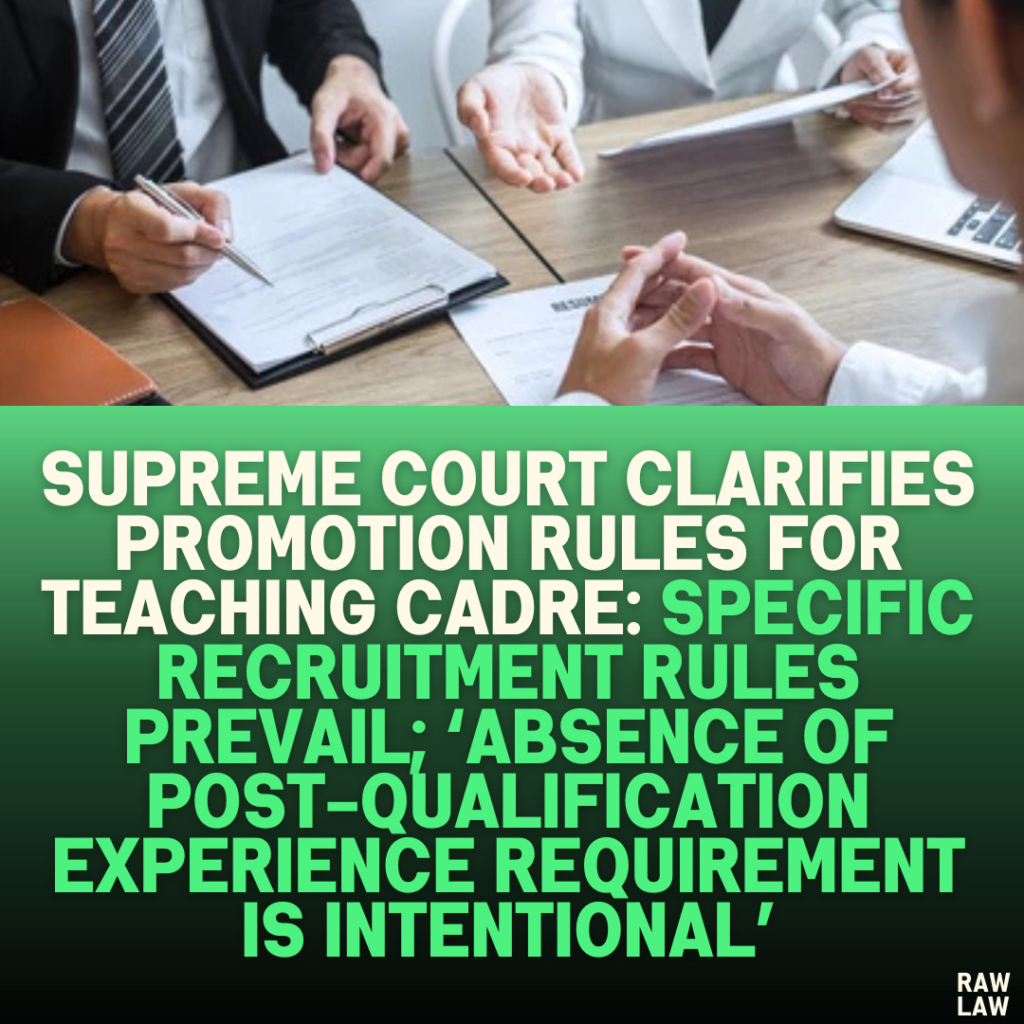Court’s Decision:
The Supreme Court overturned the Kerala High Court’s decision, reinstating the Kerala Administrative Tribunal’s judgment that upheld the appellant’s promotion to the position of Associate Professor. The Court found that the Government Order (G.O.) dated April 7, 2008, which governed the teaching cadre, intentionally excluded the requirement of five years of post-qualification teaching experience as mandatory for promotion.
Facts:
- The appellant, a medical professional with an M.Ch. degree in neurosurgery, was promoted to the post of Associate Professor in Kerala’s Medical Education Service.
- The respondent challenged this promotion, claiming that the appellant did not meet the experience requirement of five years of teaching after acquiring the M.Ch. degree.
- The Kerala Administrative Tribunal dismissed the respondent’s claim, but the Kerala High Court reversed this decision, finding the appellant’s promotion invalid due to a lack of requisite experience.
- The promotion criteria were governed by the G.O. dated April 7, 2008, which specified eligibility for teaching cadre posts but did not explicitly require post-qualification experience.
Issues:
- Primary Legal Issue: Did the G.O. dated April 7, 2008, require five years of post-M.Ch. teaching experience for promotion to the post of Associate Professor?
- Was the High Court correct in applying the general rules of service, specifically Rule 10(ab) of the Kerala State and Subordinate Services Rules (KS and SSR), to teaching cadre promotions?
Petitioner’s Arguments:
- The petitioner argued that the G.O. dated April 7, 2008, which governed teaching cadre promotions, did not require five years of post-qualification teaching experience as an Assistant Professor.
- It was contended that the High Court misinterpreted and erroneously imported conditions applicable to the administrative cadre into the teaching cadre.
Respondent’s Arguments:
- The respondent argued that, although the G.O. did not explicitly mention post-M.Ch. experience as a condition, it should be inferred from general service rules, specifically Rule 10(ab) of the KS and SSR.
- The respondent claimed that the appellant’s promotion violated the principles of fairness by bypassing more eligible candidates who met the post-qualification experience criteria.
Analysis of the Law:
1. Government Order (G.O.) Dated April 7, 2008:
- The G.O. specified distinct eligibility criteria for administrative and teaching cadre posts.
- For teaching cadre posts, it required a specified number of years of teaching experience but did not state that this experience must be after acquiring the M.Ch. degree.
2. Rule 10(ab) of KS and SSR:
- Rule 10(ab) states that experience requirements are to be interpreted as post-qualification unless otherwise specified.
- The Supreme Court found that the G.O., as a special rule, superseded the general KS and SSR, and explicitly omitted the requirement of post-qualification teaching experience for the teaching cadre.
3. Maxim of Interpretation:
- The principle of expressio unius est exclusio alterius (the expression of one thing excludes others) was applied.
- The Court observed that post-qualification experience was explicitly required for administrative cadre posts in the G.O. but omitted for teaching cadre posts, indicating deliberate exclusion.
4. Precedent Analysis:
- Shesharao Jangluji Bagde v. Bhaiyya Govindrao Karale:
- The Court reaffirmed that experience is generally considered post-qualification unless the rule specifies otherwise. However, the G.O. in this case deliberately omitted such a stipulation for teaching cadre posts.
- Arun Kumar Agarwal v. State of Bihar:
- Preference for higher qualifications applies when all other criteria are equal. Here, the respondent lacked sufficient experience, making preference irrelevant.
Court’s Reasoning:
- The G.O. dated April 7, 2008, was a special rule for teaching cadre appointments and promotions, which explicitly did not include post-qualification experience as a requirement.
- By contrast, administrative cadre posts under the same G.O. required such experience, clearly showing the framers’ intent to exclude this criterion for teaching cadre posts.
- The High Court erred in applying general service rules (KS and SSR) when a specific rule governed the case.
- The appellant had more than the requisite five years of teaching experience at the time of promotion, fulfilling all criteria outlined in the G.O.
Conclusion:
The Supreme Court reinstated the Kerala Administrative Tribunal’s judgment, holding that the appellant’s promotion to Associate Professor was valid and lawful. The respondent’s claims were dismissed.
Implications:
- Legal Clarity: The judgment emphasizes the importance of adhering to explicit criteria outlined in specific recruitment rules over general service rules.
- Rule-Making Authority: It reinforces that omissions in recruitment rules are intentional and must be respected unless explicitly contradicted by higher laws or principles.
- Special Rules vs. General Rules: This decision reaffirms that special rules governing specific cadres take precedence over general rules like the KS and SSR.
This detailed explanation provides a comprehensive view of the judgment, adhering to your requested format and excluding the parties’ names.
